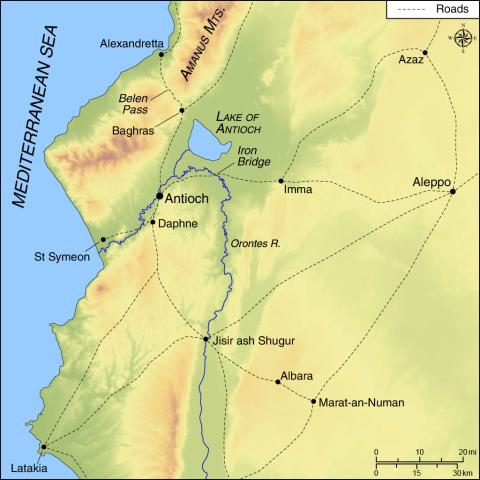The Lake Battle
[6.17.3] Tunc Boamundus iussit, ut ūnusquisque prīncipum per sē dīrigeret aciem suam ōrdinātim. Fēcēruntque ita; et ōrdinātae sunt sex aciēs. Quīnque vērō ex eīs iērunt adunātim invādere illōs. Boamundus itaque paulātim gradiēbātur retrō cum suā aciē. Iūnctīs igitur prōsperē nostrīs, ūnus comminus percutiēbat alium. Clāmor vērō resonābat ad caelum. Omnēs proeliābantur īnsimul. Imbrēs tēlōrum obnūbilābant āerem. Postquam vēnit maxima virtūs illōrum quae erat retrō, ācriter invāsit nostrōs, ita ut nostrī paululum iam cēderent retrō. Quod ut vīdit vir doctissimus Boamundus, ingemuit.
[6.17.4] Tunc praecēpit suō conostābilī, scīlicet Robertō fīliō Girardī, dīcēns: “Vāde quam citius potes, ut vir fortis, et estō ācer in adiūtōrium Deī Sānctīque Sepulchrī. Et rēvērā sciās quia hōc bellum carnāle nōn est sed spīrituāle. Esto igitur fortissimus āthlēta Chrīstī. Vāde in pāce; Dominus sit tēcum ubīque.” Fuit itaque ille, undique signō crucis mūnītus, quāliter leō perpessus famem per trēs aut quātuor diēs, quī exiēns ā suīs cavernīs, rugiēns ac sitiēns sanguinem pecudum, sīcut imprōvidē ruit inter agmina gregum, dīlaniāns ovēs fugientēs hūc et illūc; ita agēbat iste inter agmina Turcōrum. Tam vehementer īnstābat illīs, ut linguae vēxillī volitārent super Turcōrum capita.


